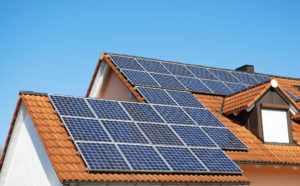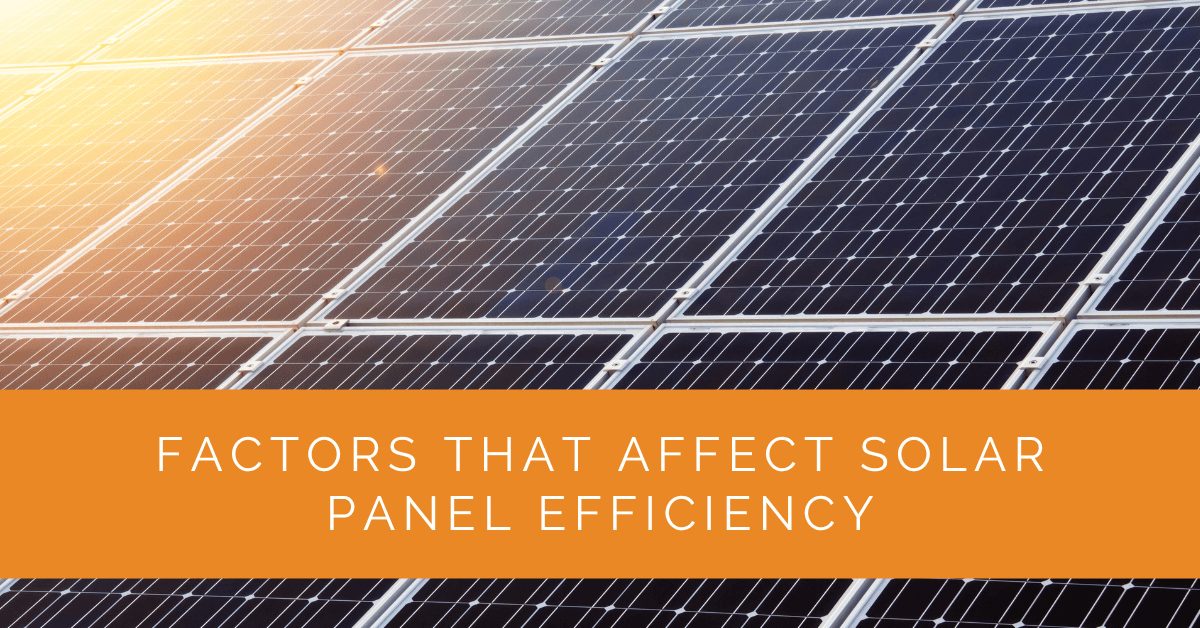Renewable energy is crucial today; solar panels are a key component of this transition. Solar panels, called solar modules or photovoltaic panels, are designed to capture sunlight and convert it into electricity. However, their efficiency can be affected by several factors. In this article, we will delve into the various elements that can impact the efficiency of solar panels and explore ways to maximize the output of a solar system.
Contents
- 1 Key Takeaways
- 2 Understanding Solar Panel Efficiency
- 3 Factors That Affect Solar Panel Efficiency
- 4 Solar Panel Efficiency Loss Calculator
- 5 Case Study: Optimizing Solar Panel Efficiency for a Residential Installation
- 6 Expert Insights From Our Solar Panel Installers About Factors That Affect Solar Panel Efficiency
- 7 Experience Solar Excellence with Us!
- 8 Conclusion
Key Takeaways
- Various factors influence solar panel efficiency, including location, orientation, shading, temperature, cleanliness, panel quality, weather conditions, solar cell type, inverter efficiency, and solar concentrators.
- Regular maintenance, proper installation, and quality components are essential for maximizing solar panel efficiency and ensuring a higher return on investment.
- By understanding and optimizing these factors, individuals and businesses can harness the full potential of solar energy and contribute to a more sustainable future.
Understanding Solar Panel Efficiency
Before we delve into the factors that can affect the efficiency of solar panels, let’s start by understanding what solar panel efficiency is and why it’s essential for solar energy systems.
How Solar Panel Efficiency is Measured?
Solar panel efficiency measures how effectively a solar cell converts sunlight into electricity. It is typically expressed as a percentage and represents the amount of sunlight converted into usable electrical power. The higher the efficiency, the more electricity a solar panel can produce from the same amount of sunlight.
Factors That Affect Solar Panel Efficiency
Location
The geographical location of your solar panel installation plays a crucial role in determining its efficiency. The sunlight a location receives varies based on latitude, weather conditions, and solar irradiance. Areas closer to the equator generally receive more sunlight throughout the year, making them ideal for solar power generation.
Orientation and Tilt
The angle and orientation at which solar panels are installed significantly impact their efficiency. Solar panels should ideally be oriented to face the sun directly, typically southward in the northern hemisphere and northward in the southern hemisphere. The tilt angle should also be adjusted to match your location’s latitude for optimal sunlight exposure.
Shade
Shading, whether caused by nearby buildings, trees, or other obstructions, can dramatically reduce the efficiency of solar panels. Even a small amount of shading on a solar cell can affect the efficiency of the entire panel. Ensuring your solar panels are installed in an area with minimal shading throughout the day is crucial.
Temperature
High temperatures can decrease the efficiency of solar panels. Solar cells work more efficiently at lower temperatures, so it’s essential to consider proper ventilation and cooling mechanisms when designing your solar system. This can help increase the efficiency and lifespan of your panels.

Clean Solar Panels
Dust and dirt accumulation on solar panels can decrease efficiency by blocking sunlight from reaching the solar cells. Regular cleaning and maintenance are essential to keep your panels operating at their best. Cleaning can be as simple as rinsing the panels with water or using specialized cleaning solutions.
Panel Age and Quality
The age and quality of solar panels can impact their efficiency over time. High-quality panels tend to have better conversion efficiency and a longer lifespan. Investing in quality panels can lead to higher energy production and a better return on investment (ROI) in the long run.
Weather Conditions
Weather conditions, including cloudy days and extreme weather events, can affect solar panel efficiency. While solar panels can still generate electricity on cloudy days, their output may be reduced. Additionally, extreme weather events can cause damage to panels if they are not properly designed and installed.
Solar Cell Type
The type of solar cells used in your panels can also affect their efficiency. Monocrystalline and polycrystalline solar cells are common options, with monocrystalline cells generally more efficient. Thin-film solar cells are another choice, offering flexibility and unique installation options but typically lower efficiency.
Inverter Efficiency
The inverter, a crucial solar system component, converts the DC (direct current) electricity generated by the solar panels into AC (alternating current) electricity used in homes and businesses. The inverter’s efficiency can impact the overall system efficiency, so choosing a high-quality inverter is essential.
Solar Concentrators
Solar concentrators focus sunlight onto solar cells, increasing their exposure to sunlight and, consequently, their efficiency. These concentrators are often used in specialized solar installations to maximize energy production.
Solar Panel Efficiency Loss Calculator
Estimate how shading, dirt, and inverter efficiency affect your system’s output.
This tool provides an approximate value for educational purposes only. Actual efficiency losses depend on system design and conditions.
Case Study: Optimizing Solar Panel Efficiency for a Residential Installation
Background
Solar Panels Network USA recently undertook a project to optimize the efficiency of a residential solar panel installation. The homeowners sought to maximize their energy production and minimize their electricity bills by addressing factors that impact solar panel efficiency.
Project Overview
The objective was to enhance the performance of an existing 4kW solar panel system by identifying and mitigating factors that were hindering its efficiency. This involved a comprehensive site assessment, system evaluation, and the implementation of targeted improvements.
Implementation
Site Assessment and System Evaluation
Our team began with a detailed site assessment to analyze the current installation. We evaluated the orientation and tilt of the panels, checked for shading issues, and assessed the overall condition of the panels and inverters.
Addressing Shading Issues
We identified several trees and nearby structures casting shadows on the panels during peak sunlight hours. To address this, we recommended trimming the trees and repositioning a few panels to minimize shading. This adjustment alone was expected to improve the system’s efficiency significantly.
Optimizing Panel Orientation and Tilt
The existing panels were not optimally tilted for maximum sunlight exposure. We adjusted the tilt angle to match the location’s latitude, ensuring the panels captured the most sunlight throughout the day. Additionally, we reoriented the panels to face true south, which is the ideal direction for solar installations in the northern hemisphere.
Cleaning and Maintenance
During our inspection, we found a significant buildup of dust and debris on the panels. We performed a thorough cleaning to remove any obstructions, allowing the panels to capture sunlight more effectively. We also established a regular maintenance schedule for the homeowners, including periodic cleaning and inspections.
Upgrading Inverter Efficiency
The system’s inverter was outdated and operating at a lower efficiency than modern alternatives. We upgraded to a high-efficiency inverter, which improved the overall energy conversion rate from DC to AC power, enhancing the system’s output.
Results
The optimization efforts resulted in a substantial increase in the solar panel system’s efficiency. The adjustments in orientation, tilt, and shading reduction led to a marked improvement in energy production. The new inverter further boosted the system’s performance, ensuring maximum conversion efficiency.
Energy Production and Cost Savings
Post-optimization, the homeowners experienced a significant increase in their solar energy production, reducing their reliance on grid electricity. This led to a noticeable decrease in their monthly electricity bills, providing immediate financial benefits.
Long-Term Benefits
The improvements also extended the system’s lifespan and reliability. With regular maintenance and optimized components, the homeowners could expect sustained high performance and efficiency for many years.
Summary
This case study demonstrates the importance of addressing factors that affect solar panel efficiency. By optimizing orientation, tilt, shading, and component quality, Solar Panels Network USA significantly enhanced the performance of the residential solar system. Our comprehensive approach ensured the homeowners maximized their investment in renewable energy, showcasing our commitment to delivering effective and sustainable solar solutions.
Expert Insights From Our Solar Panel Installers About Factors That Affect Solar Panel Efficiency
Understanding and optimizing factors like location, orientation, and shading are crucial for maximizing solar panel efficiency. Even small adjustments can lead to significant improvements in energy production.
Senior Solar Installer
Regular maintenance, including cleaning and inspections, ensures that your solar panels operate at peak efficiency. Dust and debris can significantly reduce their performance, so keeping them clean is essential.
Lead Installation Technician
Investing in high-quality solar panels and inverters is vital for long-term efficiency and reliability. Higher quality components may have a higher upfront cost but result in better performance and a higher return on investment.
Solar Energy Specialist
Experience Solar Excellence with Us!
Trust in Solar Panels Network USA, where our seasoned experts deliver top-quality solar solutions for homes and businesses nationwide. With a legacy of countless successful installations and a commitment to sustainable energy, we’re your reliable partner in the solar journey. Ready for a brighter, eco-friendly future? Call us now at (855) 427-0058 and harness the power of the sun!
Conclusion
Understanding and optimizing the factors that affect solar panel efficiency is essential for maximizing the output of a solar energy system. Factors such as location, orientation, shade, temperature, cleanliness, panel quality, weather conditions, solar cell type, inverter efficiency, and solar concentrators all play a role in determining how efficiently your solar panels can convert sunlight into electricity.
To ensure the best possible performance from your solar panel system, it’s crucial to consider these factors during the planning, installation, and maintenance stages. By doing so, you can increase the efficiency of your solar panels, reduce your energy costs, and contribute to a more sustainable and environmentally friendly future. Please maximize the abundant solar energy available and harness its power to its fullest potential.
About the Author
Solar Panels Network USA stands at the forefront of solar energy solutions, driven by a team of seasoned solar engineers and energy consultants. With over decades of experience in delivering high-quality solar installations and maintenance, we are committed to promoting sustainable energy through customer-centric, tailored solutions. Our articles reflect this commitment, crafted collaboratively by experts to provide accurate, up-to-date insights into solar technology, ensuring our readers are well-informed and empowered in their solar energy decisions.

